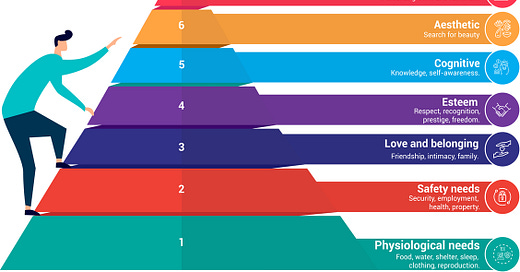Housing Is A Fundamental Need
As real estate agents, property managers, lenders and real estate investors we deal with housing. It’s really that simple. It's really that complicated. Residential real estate is more than housing: it’s people, it’s finances and it’s security.
Security
Let’s start with the end in mind. There are so many reasons a person looks for a home. Looking at Maslow’s Hierarchy of Needs, we know that a house is, at its very root, a physiological need as a shelter, a place to sleep. A shelter is then immediately “upgraded” to a safety need as once we’ve found a place where we can rest, we begin to choose the safest location with the best defenses.
For all people there are many, many definitions of what consists of basic and safety needs, but make no mistake, these are needs that are required to be filled. Just look at the ever exploding homeless camps in your city. These displaced people, by circumstance or choice, by in large tend to cluster in places they believe they will not, or cannot, be bothered. The “safety” in numbers game begins to factor in and the next thing you know you have a sizeable population gathered.
Do we also not see that our more wealthy clients begin to use real estate as a way to actualize their needs of intimacy, esteem and certainly aesthetic? With wealth comes an ever increasing ability to shore up the perceived needs of safety, as well.
This is human behavior. We as real estate professionals should always know these needs, recognize these needs and help our clients to prioritize these needs. Work with a client’s instinctual nature, not against it.
In future articles we will discuss in more detail the psychology of real estate as much or more than the “how-to” of selling more houses, renting more units.
Financial
In our country we have set up our economy so that housing is a stand-alone industry. For better or worse, this is where we are. This author has certainly benefitted from the housing industry as have tens of millions of others. This set up is used throughout the Western economies with variations and exceptions. Even here in the United States we have public-private cooperative initiatives to provide housing for the economically disadvantaged, the aged, veterans and for the physically or mentally unable.
By in large, however, housing is an industry. As with any industry the ability to pay stands right up front and center.
Earn a lot? Buy whatever you want. Struggle financially, well, you better pay for housing first, though as a property manager I very often see people pay other needs first, quite often their mobile phone bill. For many, a communication device provides better access to love and belonging, security and employment and even sex and food, than does housing.
Here is a fundamental challenge we face as housing professionals; private builders, developers and real estate investors incur higher and higher costs in producing and providing housing and these costs are outpacing the wage growth of the lower and middle class. What systematic changes in approach and production do we need to make in order to bring the forces of higher costs and lower wage growth closer together?
Think about this, if even from a greed standpoint. If there are fewer and fewer people that can afford the housing you can offer then what does that do to the value of the housing from entry point to luxury?
Looking into the future of this newsletter, I can see many more articles, op-eds and educational pieces on the topic of financing real estate endeavors as well as how our economy impacts opportunities for agents, investors and end users of housing. I think that includes pretty much anybody reading at this time.
People
People are people. There are financially conservative people and people who will risk it all. There are reasonable people, and there are unreasonable people. There are overcomers and there are victims. And there are all shades in between.
Then there is “us.” There is me. Beyond my capability of preventing I bring my own perceptions, past, opinions, possibilities and baggage to each and every person I interact with. (Yes, Mrs. Sanders, I know I ended my sentence with a preposition.) Understanding where I come from helps me to understand how to better work with people in understanding where they come from.
It is the fervent belief of this author that the more often I can recognize that the person in front of me is a real live human being and not just a customer, not just a tenant, not just a rental property owner the better off the entire experience for both of us will be. When working with people it doesn’t have to be transactional, nor confrontational. Rather, we can look for the benefit that both are seeking and see where we can meet, if we can meet at all.
Seeking to understand the people we are put into contact with rather than asking them to first understand us is sneaky little tactic, and basic human courtesy, that often disarms the person we are working with and allows us the advantage of knowing what it is they are really after. Weird, right? From there we can actually begin to help them.
People. People will always be a topic here at Real Estate Writer.




